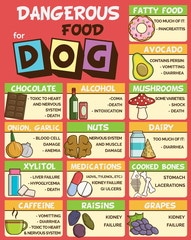There are a few foods that are toxic to dogs that you should be aware of. If your dog ingests something potentially toxic, you should contact your veterinarian or the Pet Poison Helpline (855-213-6680, fees apply) immediately.
Chocolate
According to the Merck/Merial Manual for Veterinary Health, chocolate contains both xantheose and caffeine, both of which accelerate the dogs heart rate. The risk of toxicity depends on the type and amount of chocolate consumed and the weight of the dog (calculate your dog’s risk of toxicity with this easy-to-use program). The concentrations of these toxic substances vary among different types of chocolates. Here are a few in order of xantheose content:
- Cocoa powder (most toxic)
- Unsweetened baker’s chocolate
- Semisweet chocolate
- Dark chocolate
- Milk chocolate
Knowing the type and amount of chocolate your dog ate can help determine if you have an emergency. For example, a dangerous dose of milk chocolate is approximately one ounce of chocolate per pound of body weight. Since an average Hershey’s Milk Chocolate bar is 1 and 1/2 ounces, a single chocolate bar can be serious, especially for smaller dogs. Consuming a very small piece, on the other hand, probably won’t cause serious harm, especially if it is a larger dog.
The Signs of Chocolate Poisoning
Symptoms usually appear within 6 to 12 hours after consumption, and may last up to 72 hours. They include the following:
- Vomiting
- Diarrhea
- Restlessness
- Increased urination
- Tremors
- Elevated or abnormal heart rate
- Seizures
- Collapse and death
Older dogs and dogs with heart conditions are at a higher risk of sudden death


